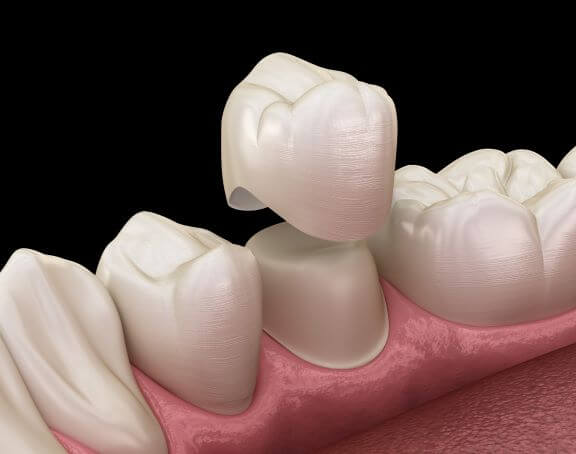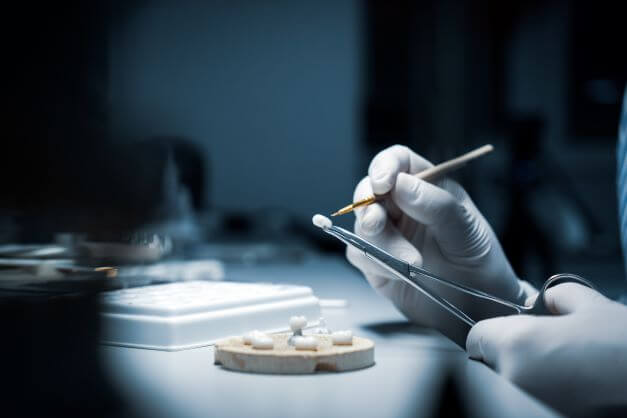
First Published: 2nd November 2022, written by Olivia Doonan | Last Updated on 6th April 2024 | Reviewed and Edited by Chloe Safilo
Even if you’re contemplating a dental crown for cosmetic or oral health reasons, there are several factors to consider before making this decision.
This article will draw your attention towards some of the most important factors to consider before obtaining a dental crown, assisting you in making the best treatment choice for your dental concerns.
These consist of the cost of a dental crown, the treatment, the time it takes to complete the operation, and the aftercare necessary.
What is a Dental Crown?
Dental crowns are coverings that are placed on your existing, broken teeth. When fillings are no longer effective, crowns are utilized to preserve, cover, and restore the contour of your teeth.
Such caps can safeguard a rotting or cracked tooth, hold a dental implant or bridge in position, or even improve the appearance of a discoloured tooth. As a result, dental crowns are regarded as a highly successful therapy for recovering teeth that have been injured in some way.
A partial crown is employed when a tooth or a group of teeth do not require a full dental crown yet are too damaged for a simple filling. A crown, sometimes known as an only, helps to restore strength to a weakening tooth. Partial crowns also assist in keeping your teeth healthy and maintaining the integrity of your teeth.

Types of Dental Crown
Crowns can be constructed of porcelain, metal, or a mix of the two. The most common material is porcelain, which closely mimics the natural color of teeth and is exceedingly durable. Their strength and endurance are critical since the crown must endure the everyday stresses of chewing and biting.
In most circumstances, if you want a custom-made crown, you should expect to visit your dentist several times. It is not a procedure that a dentist can perform in a single appointment unless the dentist has a CEREC® or comparable system that allows patients to acquire the crown in one visit.
For this reason, we recommend bluewaterdentists as they have all the facilities that you need to get your dental crown successfully.
In the following section, we’ve highlighted five factors that you need to consider, starting with the most important one; cost!
1. Cost
Suppose you need a dental crown for a medical reason. In that case, your dental insurance should cover a portion of the surgery and the device itself. Suppose you desire dental crowns for cosmetic reasons. In that case, your insurance is unlikely to protect the surgery, and you will be responsible for the entire expense.
Dental crowns range in price from $500 to $3,000 per tooth, depending on the material used. Porcelain crowns generally range from $800 to $3,000 per tooth. Porcelain fused to metal crowns range in price from $800 to $1,400 per tooth. Metal crowns range in price from $800 to $2,500.
Porcelain-infused metal crowns, metal or gold alloy crowns, or all-porcelain crowns are the most common materials cosmetic dentists use. These are among the standard, long-lasting materials. Metal crowns are the least expensive alternative, but they may not look as natural as porcelain crowns.
Inquire about the material used if a dentist offers a meagre price for a crown. It’s not worth going with inexpensive alloys that flex readily, cast badly, or rust quickly.
It would help if you also kept in mind that the overall cost of acquiring a dental crown is determined by various additional factors such as your location, dentists expertise, and materials used.

2. Procedure
Crown treatments can be completed over two appointments or in a single day. Often, you will leave your initial meeting with a temporary crown in place until your permanent crown is made, which might take several weeks.
On the other hand, a crown can be made in-house using a CEREC® device or comparable equipment. This approach does not necessitate a temporary crown and may be done in a single day.
Suppose you acquire a dental crown from a specialist who can make dental crowns in-house. In that case, the process becomes significantly more straightforward.
Your dentist will examine your teeth and jawline during your initial appointment to identify any abnormalities, including tooth decay, cracks in the tooth, and more.
Suppose the X-ray indicates evidence of pulp infection. In that case, you may need a root canal operation before you may have a dental procedure. After that, your tooth is sculpted to ensure that the crown correctly fits the damaged tooth.
When getting a dental crown you need to ensure that the dentist has the essential pieces of dental equipment.
3. Aftercare
When a patient gets a permanent crown, it is considered best practice to adhere to the above mentioned recommendations. These ought to be followed during the first few days. A dentist will advise the patient to avoid eating hard or sticky foods.
A patient must avoid consuming alcohol or eating immediately after receiving a crown. Because the local anaesthesia will still be effective, it is best to wait until it wears off.
If you’re like most individuals, you’ve received a temporary crown to preserve the prepped abutment tooth while the final crown is built to match your jaw and bite form. Since the temporary crown is more delicate than the final crowns, this implies extensive care to avoid any breakage and malalignment.
Temporary crowns are more delicate, and more care is required to ensure that the restoration correctly sets and doesn’t crumble or fall out. Patients should refrain from eating or drinking for at least 30 minutes after the temporary cap is placed to allow the cement to dry.
Chewing gum and eating chewy, complex, or sticky foods should be avoided since these might cause the repair to dislocate. Patients should also chew using the other side of their mouth as much as possible from where the crown is placed. It’s advised to be careful when brushing your teeth and flossing immediately around the temporary cap should be avoided.
4. Alternatives
There are several options for receiving a dental crown. A dental filling is one alternative. When the dentist fills the hole in your tooth with a substance such as an amalgam, gold, or composite resin, this is referred to as a filling. A dental veneer is yet another possibility.
This is when your dentist applies a slight, made-to-order ceramic coating on the front edge of your tooth. The final alternative is to have a dental implant. The dentist inserts a metal post into your jawbone and connects a prosthetic tooth to it.
Pores are corrected by tooth fillings. The dentist will remove the decay from the tooth, and the hole will be filled with the substance. Amalgam, gold, and epoxy are among the most utilized filling substances.
Dental veneers are used to make your teeth seem better. They are constructed of ceramic and are specially designed to accommodate the front teeth.
Veneers can be used to repair a variety of aesthetic concerns, such as discolored, chipped, or malformed teeth. They are also stain-resistant compared to natural teeth. Veneers are more expensive than other choices and are not reversible.
Missing teeth are replaced by dental implants. A metal post will be inserted into your jawbone, and a replacement tooth will be attached. Implants are the most costly choice, but they also last the longest.
They also have the appearance and function of natural teeth. However, implants need surgery and carry the risk of infection.
5. Lifetime
Dental crowns are intended to endure a long time. However, they are not permanent. A dental crown has an expected duration of roughly ten years. However, this might vary depending on the type of crown and how it is cared for.
To keep your dental crown in perfect shape, you must exercise good oral hygiene, which includes brushing twice a day, flossing daily, and using mouthwash.
You should also avoid chewing on hard items like ice or hard sweets, which can harm your crown. If you have a propensity for clenching or grinding your teeth during the night, your dentist might advise you to wear a retainer to protect your dome.
Caring for your dental crown is essential not just for the crown’s durability but also for your general oral health. Bacteria can accumulate around the crown, causing tooth decay or gum disease.
As a result, cleaning and flossing routines around the crown is going to help you maintain your dental crown in the long run. It is also essential to visit your dentist regularly for routine check-ups.
In some cases, even with good maintenance, some people have had their dental crowns replaced within a short period of time. Again, there are several factors that can cause premature damages.
Final Words
This article sincerely addressed the basics one should contemplate before beginning dental crown procedures . If you are considering this option, talk with your orthodontist and assess thoroughly. With some research, you can make the right call.





















































